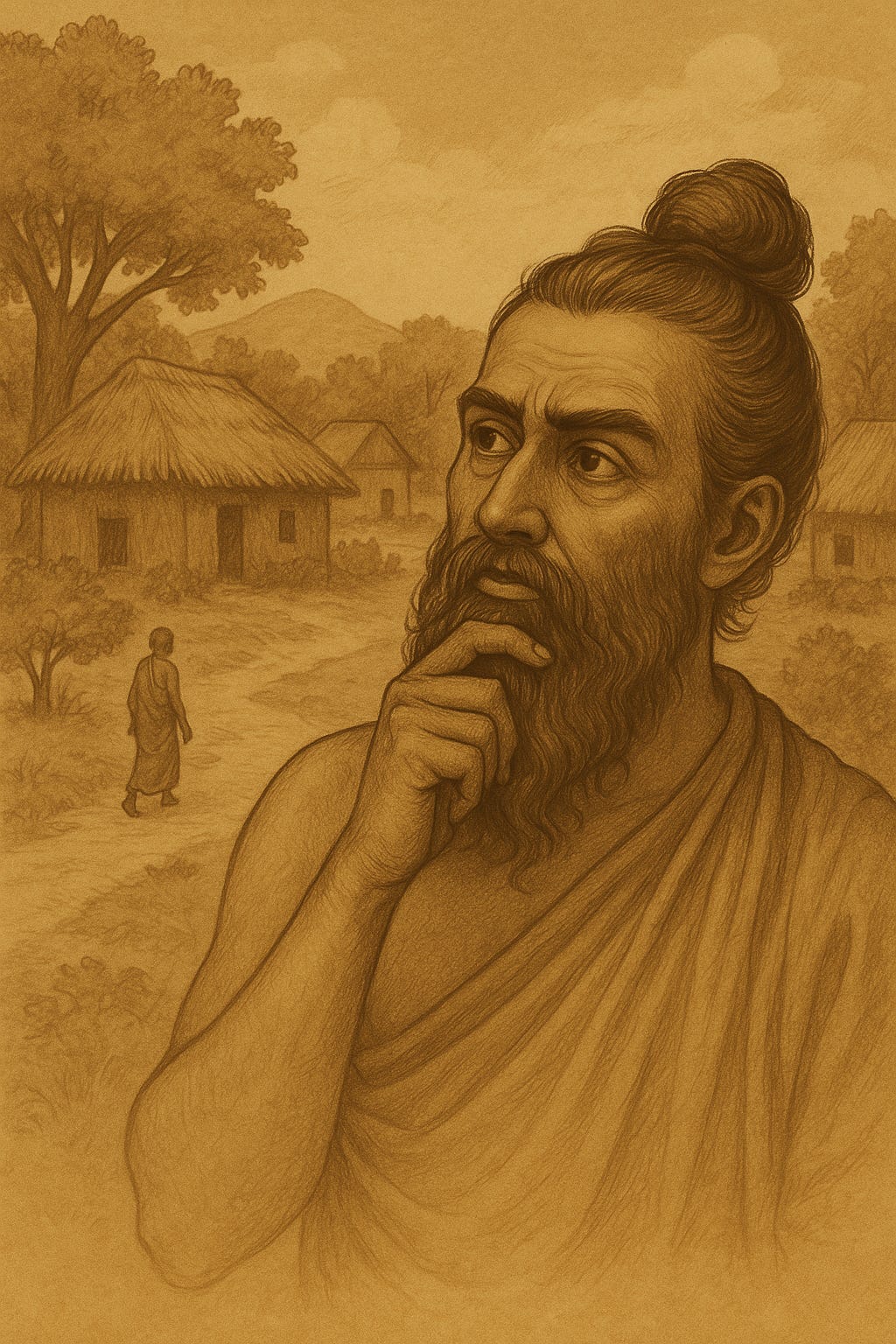Difficult questions about the soul
Considering that even great sages have difficulties in understanding the nature of the soul, it is not surprising that we also have questions. Here are a few particularly complicated ones.
There are quite a few questions about the soul that are difficult to understand. In the Gītā, Krsna says that the soul is inconceivable, and elaborates by mentioning that "Some look on the soul as amazing, some describe him as amazing, and some hear of him as amazing, while others, even after hearing about him, cannot understand him at all."
Considering that even great sages have difficulties in understanding the nature of the soul, it is not surprising that we also have questions. Here are a few particularly complicated ones.
- Do jīvas in the spiritual world have knowledge about the material world?
Some souls in the spiritual world may have an understanding about the material world, such as, for example, Viṣṇudutas that have the service of sometimes coming here to assist devotees in different dangerous situations, as well as to escort them back to Godhead. In the Bṛhad-bhāgavatāmṛta, Nārada Muni instructs Gopa Kumāra to return to the material world from Vaikuṇṭha and take birth in Vṛndāvana to perfect his devotional service and thus attain the Supreme abode. Even after attaining Goloka, he appeared in the Earthly Vṛndāvana to instruct the Brāhmana and bring him back to Godhead.
However, these appear to be specific cases. In general, the material energy has no influence over the spiritual world, and the devotees there are so involved in the ecstasy and service to Krsna that they have no time to enquire about the existence of another world apart from the spiritual reality where they live. They are fully absorbed in the reality of their service to Krsna.
- How was it possible for us to become involved in the material world, being us once in the spiritual world, where everyone is constantly engaged in Krsna Consciousness?
This question has no answer, because in reality, we never leave the association of Krsna, as Prabhupada explains. The bond of the soul and Krsna is eternal and can't ever be broken. The question of "how did I fall into the material world" starts from the presumption that we were with Krsna and somehow we got separated from him. Since this assumption is false, the question has no answer.
It is just like going to a hospice and meeting a patient who asks: "How did I become Napoleon?" This question has no answer, because he is not Napoleon and will never be. It is just be delusion of a crazy person.
Similarly, "How did I fall into the material world" is a misleading question because it implies we got separated from Krsna, which is untrue. We are always with Krsna, and in fact, even in the conditioned state, we are embraced by Him and stay with Him every night when we enter into deep sleep, as indicated in several of the Upanisads. What makes us unaware of these encounters is just our fixation on the illusion of the material world. As soon as we realize this, we are back with Krsna, and we understand that the whole material existence is just like a dream. Somehow, we got into this dream, and we just have to wake up.
Prabhupada argues against insisting on this point of the “fall" of the jīva, because it leads to misguided assumptions. Instead, one should try to understand that conditioned life simply means the absence of Krsna Consciousness, and from there try to revive our forgotten relationship with Him.
- What is the meaning of the soul being immovable, if we are constantly going from one body to the other?
Lord Kapila explains that just as Krsna never enters into contact with the material energy, the soul also does not. The presence of the soul in the material reality is indirect, through the reflection of the consciousness of the soul in matter, just as the sun is reflected in a bucket of water inside a room, without ever directly entering there. Just as the sun may appear to become blue or red if reflected in water tinged in these colors, our material consciousness manifests in different ways when reflected in different combinations of the material modes.
This reflected consciousness is then covered by the false ego, mind, intelligence, and subtle senses, forming what we call the "subtle body" that goes from one body to the other, transported by the vital airs. The soul is, however, not directly included in the subtle body. The subtle body transports the consciousness, or the attention of the soul, which goes from one body to the other. The soul proper remains with Krsna, never leaving his original position.
We then have another point in this connection, which is the definition of "jīva". Much confusion comes from misunderstanding this point.
Sometimes, the word "jīva" is used in the sense of ātma, the pure soul in its original, uncontaminated state (śuddha-jīva). However, in most passages, jīva is used in the sense of jīva-bhūta, the conditioned soul struggling with the senses and mind. We can see that on SB 4.29.74, for example, the jīva is described as the combination of the consciousness of the soul with the material mind and senses. This may not be immediately clear when one reads the translation without previous knowledge of the topic, but it is very clearly indicated in the Sanskrit by the words liṅgaṁ and cetanayā yukto jīva.
In his purport, Prabhupada mentions that, "Here it is also explained that the living entity comes in contact with the sixteen material elements and is influenced by the three modes of material nature. The living entity and this combination of elements combine to form what is called jīva-bhūta, the conditioned soul that struggles hard within material nature."
Prabhupada uses the words "jīva", "jīva-ātmā", "living entity", and "conditioned soul" almost interchangeably, sometimes to describe the conditioned soul, the combination of spirit and the subtle body, the particle that transmigrates from one body to another, and sometimes to describe the pure soul. This purport is important to note, because it is one of the few places where Prabhupada explains this nomenclature. If the word jīva is always taken in the sense of the pure soul, many passages of the scriptures make no sense. One has to be able to understand by the context if a certain passage speaks about the pure soul, or the soul in the conditioned stage.
When Lord Caitanya says "jīvera ‘svarūpa’ haya — kṛṣṇera ‘nitya-dāsa’" (It is the living entity’s constitutional position to be an eternal servant of Kṛṣṇa), for example, He speaks about the pure soul, while when SB 4.29.74 mentions evaṁ pañca-vidhaṁ liṅgaṁ, tri-vṛt ṣoḍaśa vistṛtam, eṣa cetanayā yukto, jīva ity abhidhīyate, it speaks about the conditioned soul. One has thus to understand what is referred to in each passage according to the context to avoid misunderstandings.
The text explains that the subtle body (liṅgam, in the sense of liṅga-śarīra or sūkṣma-śarīra), plus the five sense objects (pañca-vidham), combine with the consciousness of the soul (cetanayā), resulting in the jīva (the conditioned soul).
Prabhupada explains this in detail in the second half of his purport, interpreting the verse according to the teachings of Lord Kapila in the third canto: "The total material existence is first agitated by the three modes of material nature, and these become the living conditions of the living entity. Thus the subtle and gross bodies develop, and the ingredients are earth, water, fire, air, sky and so on. According to Śrī Madhvācārya, when consciousness, the living force in the heart, is agitated by the three modes of material nature, then the subtle body of the living entity, consisting of the mind, the sense objects, the five senses that acquire knowledge and the five senses for acting in the material condition, becomes possible."
These are very delicate philosophical principles. Lord Kapila explains that the pure soul doesn't directly interact with matter. Rather, the consciousness of the soul (cetanā) is reflected in matter, creating the conditions for the appearance of the subtle body. The "jīva" described in the text (clarified as the jīva-bhūta by Prabhupada in his purport) is thus the combination of this reflected consciousness and the subtle body. The three modes of material nature can't touch the pure soul, but they can influence the subtle body, making one act through the body and senses.
The situation of the soul in the material world can be thus compared to a person seated in the cinema, watching a movie. Even though one doesn't enter into the movie, this doesn't prevent one from being emotionally affected by what he sees on the screen, sharing the anxieties of the hero or heroine, crying with them, and so on. At the end of the movie, one is forced to leave the room and join another session, again sharing the happiness and sorrow of the protagonists. In this example, the scenes of the movie are the actions of the senses, conducted by the three modes. The attention of the soul remains imprisoned for a long time. Even though we are free to leave at any moment, this only happens when we are awakened to our real identity by transcendental knowledge, which finally breaks the illusory identification with the gross and subtle bodies, allowing us to become fixed in the service of the Lord.
This understanding of the difference between jīva as the pure soul and jīva as the subtle body is essential to understanding several philosophical points. The "jīva" (as the subtle body) was never with Krsna, or in fact, out of this material world. If we cut this "jīva" open, there is no Krsna Prema inside. However, when we speak about the "jīva" as the pure soul, it never leaves the association of Krsna.
- What does it mean when we say the soul is present in the heart?
The subtle body is present in the heart, and the attention of the soul is present there, together with the Lord that appears there indirectly as Paramātmā. Just like when we play a video game, we "enter" the game in the sense that our attention goes there.
- If the soul's consciousness operates the body, what operates the body when we sleep, since during sleep it’s said that consciousness converges to the heart?
The real maintainer of the body is Paramātmā, the Supersoul, and not the jīva. When we sleep, the consciousness of the soul withdraws from the external reality and enters into the heart, where we stay with the Lord. Paramātmā, however, remains always conscious, and thus the body continues being maintained, even though the consciousness of the soul is withdrawn from it. The real reason the body dies after the soul leaves is because Paramātmā also leaves.
- Do viruses have souls?
In general, viruses are accepted as living beings, which implies they have souls. However, they are in the very limit we could define as a "living being" because they show living functions only when influencing the functions of another cell.
The scriptures don't directly describe viruses among the 8,400,000 life forms. When the word "virus" appears in some translations, it is just an interpretation of some other Sanskrit word. However, Prabhupada appears to accept viruses as possessing a soul, although in an unconscious state. As he explains in a conversation:
"Brian Singer: Yeah? And how far down in the animal world? Like you have the worm and also bacteria and the virus. Is also true?
Prabhupada: That is the difference. I have already told you that the soul is in the child, and the soul is in the body of the father, but the child’s soul is…. Or…. Soul is everywhere, but the proportionate consciousness is not developed. Just like wood. In every wood there is fire. Do you admit?
Brian Singer: In every…?
Pusta Krsna: Wood.
Brian Singer: Oh, yeah, yeah.
Prabhupada: Now, if a small piece of wood, a small piece of fire. And big piece of wood, big piece of fire. Similarly, according to the body, the consciousness of the soul is present.
Brian Singer: In proportion to the form of life.
Prabhupada: In proportion to the body the…. The same fire, but the proportion of the fire is different, in proportion of the piece of wood. Similarly, according to the body, the consciousness is manifest. The consciousness of a child is different from the consciousness of the father because the body is different. So in the human form of life it is expected that the consciousness should be fully developed. If it does not develop by some reason or other, then it remains like animal. In the human form of life it is expected that the consciousness should be fully developed."
- What is the meaning of saying that the material world is 1/4 of the whole creation, or that the spiritual world is 3/4 if the creation is infinite?
It's important to us to understand that beyond the confines of this material creation, there is another world, and it has all kinds of manifestations in greater variety and quality than here. We live in a small, remote, dark corner of creation, and the goal is to get out.
From our point of view, both the material and spiritual world are "infinite" since we can't measure either of them. Still, the scriptures make it clear that the spiritual world is greater, to keep it clear in our minds what the goal is. Vast as a prison may be, it is still just a small part of the city.
If you read this article to the end, give it a like or write a commentary. This makes Substack recommend it to more people.
Read also:






Amazing article prabhu ji . Very enlightening. You covered every aspect of soul . Thank you so much prabhu ji 🙏